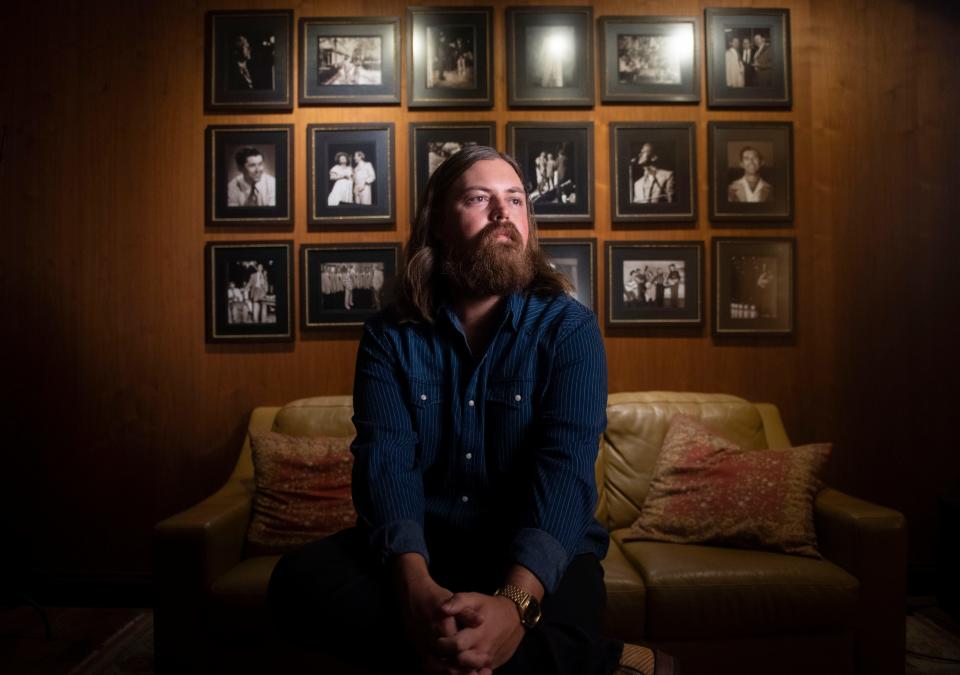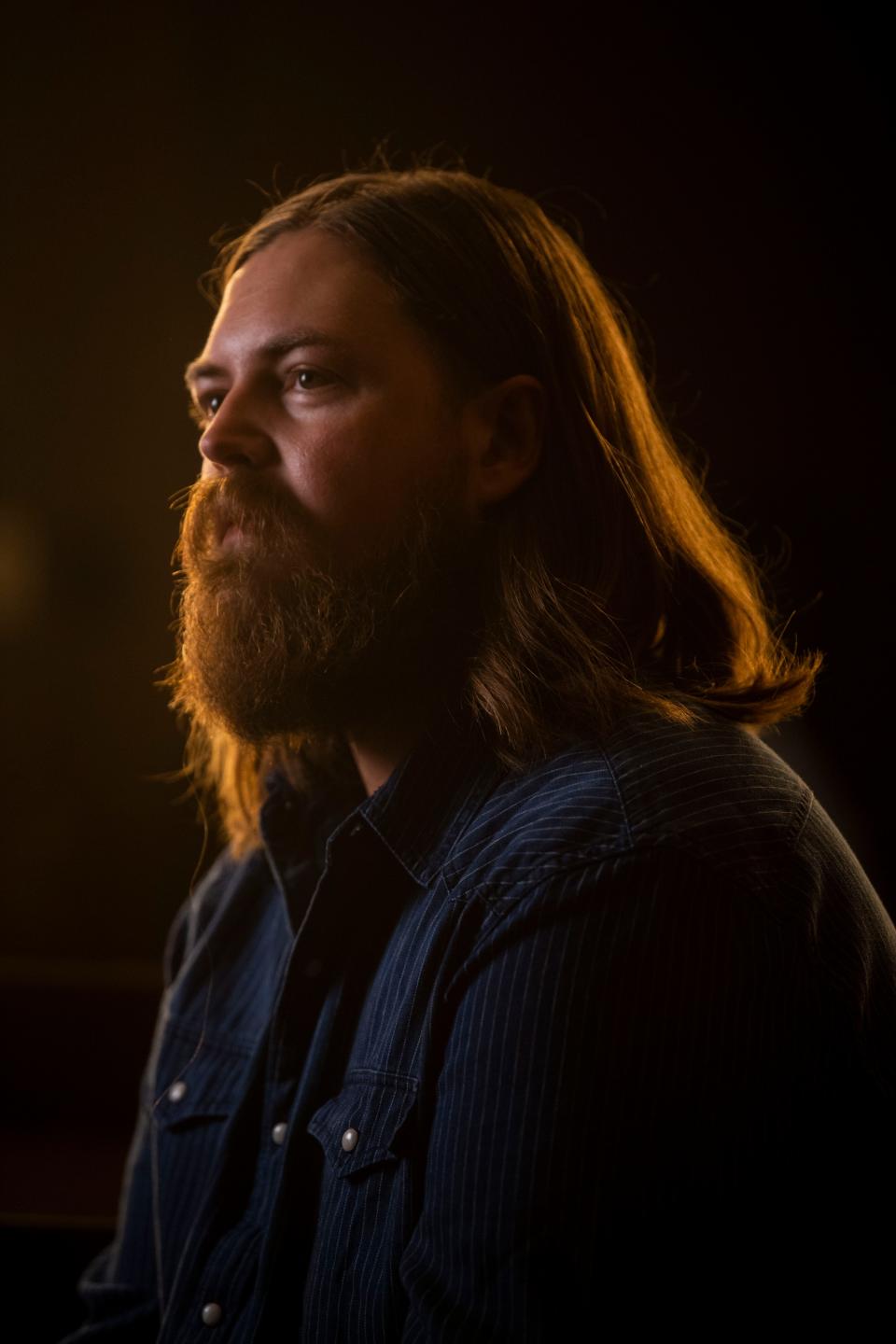Alabama's Drayton Farley connects with fans' blue-collar lives on his way to musical fame
Less than three years ago, Drayton Farley had 2 million percent fewer regular Spotify listeners than the million-plus he has now.
The idea of being an advertised act at 2024's Stagecoach Festival would seem like a cruel joke to tell him as he said goodbye to his wife and children, then headed to work on the assembly line at a Mercedes-Benz factory 15 minutes down the road from his home in Woodstock, Alabama.
A September 2023 stop along the way to his stunning, meteoric rise from being digitally plucked out of a hometown of less than 2,000 people found him at Nashville's Grand Ole Opry for his debut performance.
Lives lived "substantively" are the calling card of artists like Farley, whose work being found on independently controlled Bandcamp pages and YouTube sites with less than 500,000 followers is much more in line with his development than multimedia campaigns and Music Row release parties.

To The Tennessean, Farley adds that fans searching for "deeply honest and reflective music" that authentically relates to their paycheck-to-paycheck lives are finding themselves reflected in his sounds.
He has released music in album, EP or single-track form every 10 weeks since the depths of the COVID-19 quarantine in 2020.
For the past six months, the success of songs like "Pitchin' fits" and "Blue Collar" has gained broader appeal as his March 2023 album "Twenty on High" and recent "Kudzu Wild" EP have been distributed by Nashville's Thirty Tigers Records.
"Anxious human beings struggling through life are all in the midst of pouring their hearts and minds out in public these days," Farley says.
In "Pitchin' Fits," the Alabama resident sings: "'Cause it's a long and hurtful phase / And I don't know if I belong here at all / But when I'm here with you / I don't mind at all."
For the residents of thousands of small towns across America, the song, two years since its release, has become an anthemic ode to when a blue collar feels like a horse collar and the stress of being yoked to a nation amid a recession is too much to bear.
For as much as the song is immeasurably sad, it's also, in Farley's mind, "a confident song about not wanting to give up, even when things appear too difficult."

Farley is 27 years old and has been playing the guitar for over half his life. Playing the instrument grew from sneaking out the "fat-necked" Esteban classical guitar his parents bought his older sister from a local Walmart and learning chord progressions from a poster sold with the instrument.
Playing Deep Purple's "Smoke on the Water," Ozzy Osbourne's "Crazy Train" and Pearl Jam's "Last Kiss" evolved into hearing a who's who of Americana-favored, country-leaning artists whose releases deluged the pre-COVID-19 marketplace. Those artists and albums included:
Jason Isbell's 2013-released "Southeastern."
Sturgill Simpson's "Metamodern Sounds in Country Music" and "A Sailor's Guide to Earth."
James McMurtry's 2015 album "Complicated Game."
John Moreland's "High on Tulsa Heat."
Tyler Childers' 2017 breakout "Purgatory."
John Prine's "The Tree of Forgiveness" in 2018.
"I was excited to learn, via releases like these, that country music wasn't just all about corn fields and pickup trucks," Farley jokes.
"Twenty on High" yielded the lead single "Norfolk Blues."
The song reflects on his post-high school years working as a Norfolk Southern railway subcontractor.
Their business? The interstate transfer of rail freight, including raw materials, intermediate products, and finished goods in the Eastern United States.
"Can't afford to break, so you always bend / It's all the way, it's always been / It's back and forth and back again / It's all the way, it's always been," he sings.
Cross-pollinate "The Legend of John Henry's Hammer" with selections from Tyler Childers' catalog and blend in the birthing of attempts at what a press statement calls "the humor and subtlety of John Prine, the directness and honesty of Bob Dylan, and the everyman gravity of Pete Seeger."
Farley's work is somewhere just below that excellence and putting down work boots to achieve that surface of success.
More music: Nashville comedian Dusty Slay's hilarious craft evolves with latest Netflix special
"I'm perpetually trying to expand upon what I've learned and am continuing to learn from the craft of songwriting," says Farley.
"Norfolk Blues" represents his attempt to craft a song that's 10% inspired by his own life and 90% perspiration from song-crafting work.
Turn around those percentages and the composition that emerges as "Norfolk Blues" appears.
"I tried to create a character that wasn't me, but that's still harder than I ever anticipated. I'm learning that writing real, non-fabricated songs is impossible while trying to (divorce your lived reality) from the process."
About writing and performing "therapeutic" music that exists with "true value and meaning," Farley is still reticent to accept the singer-songwriter stardom of the group of artists who have inspired his craft.
"I'm not some kind of prolific artist," he says. "People will eventually discover that all I'm doing is just writing what the people are feeling."
This article originally appeared on Nashville Tennessean: Drayton Farley rises to stardom with 'Pitchin' Fits' and 'Blue Collar'

